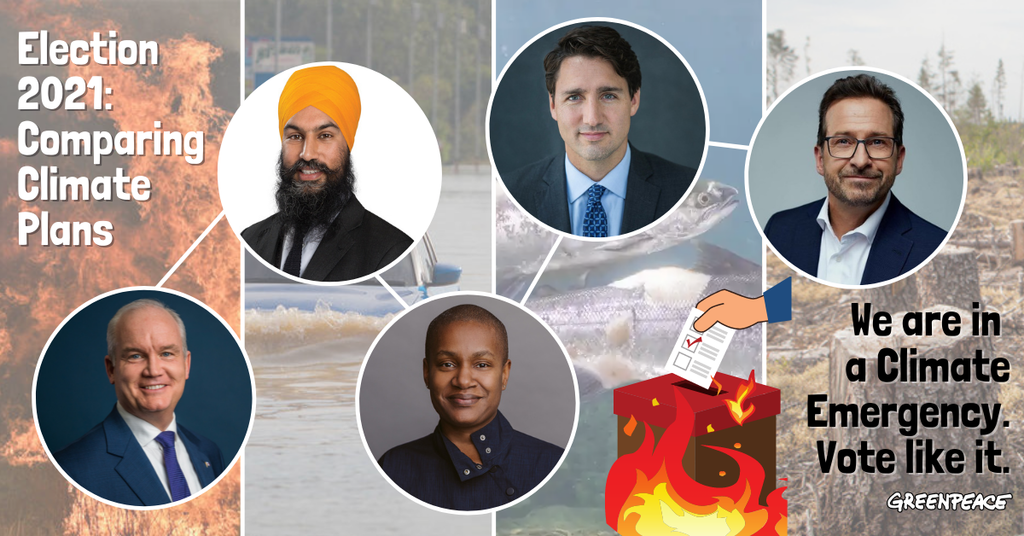
This federal election marks the first time that all of the major parties have detailed plans to address the climate crisis (because they have learned that running on climate inaction makes them unelectable in 2021).
This is not to say that all party platforms are equal – see the table below for an outline of their respective proposals. We hope you will take a look and take it into consideration when you vote.
Climate plans can be assessed based on their ambition (how fast and how far are they proposing to reduce carbon pollution?) and credibility (are they proposing measures which can actually achieve the reduction targets they have set?). The weight that is put on ambition vs credibility varies between analysts, but at Greenpeace Canada we would argue that we need both (see an excellent analysis of this dynamic from Seth Klein).
It is exciting that we are no longer debating whether to act on climate change, but how far and how fast we should go. But as so many of our insightful supporters ask: Can we trust any of these parties to do what they promise once they take office?
Our answer is simple: they will follow through (and increase ambition) if – and only if – they are under enough pressure to do so.
At Greenpeace Canada, we are preparing to work with our supporters, allies and the climate champions who get elected to Parliament to keep those feet to the fire. And with the likelihood of another minority government, we could be in an excellent position to make sure that the new government builds on the best ideas from all the parties to deal with the climate emergency.
This being said: at a time when we desperately need to do much more, the Conservative Party platform proposes to lower the current level of climate ambition.
While most major parties are putting forward proposals for how to strengthen climate action in Canada, the Conservative Party’s climate plan stands out for having a number of proposals that would undermine climate ambition and action. These include: abandoning our commitment under the Paris agreement and lowering our already-inadequate emissions target, increasing subsidies for fossil fuels, a draconian new law targeting climate activists, and support for more tar sands pipelines than even industry is proposing.
Key commitments in the 2021 party platforms (see detailed platforms from Conservatives, Liberals, NDP and Greens)
Click on the table and use the arrow keys on your keyboard to scroll back and forth to view all the information in the table.
| Conservatives | Liberals | NDP | Greens | Bloc | |
|---|---|---|---|---|---|
| 2030 emissions reduction target (vs 2005) | 30% (non-compliant with Canada’s commitment under Paris climate agreement) | 40-45% | 50% | 60% | 51% |
| Carbon pricing in 2030 ($/tonne) | Industry: $170 (but only if the US matches) Households: $50 | $170 for all | $170 for all. Close some loopholes for big emitters. | $275 for all | Support Quebec’s cap and trade system (WCI) |
| Climate finance | N/A | Move towards mandatory climate-related financial risk disclosures for corporations. | Review legislation governing Bank of Canada, EDC & CPPIB to align with net-zero. Ensure mandatory transparency on carbon risk from publicly traded companies. | Require federal public investment funds (including the Canada Pension Plan Investment Board) to divest from fossil fuels. | Mandatory climate risk disclosure. Legislate end to finance of new fossil fuel projects & require banks to publish plan to phase-out fossil fuels. |
| Zero emission vehicles mandate | 30% by 2030 | 50% by 2030, 100% by 2035 | 100% by 2035 | 100% by 2030 | Legislate requirement for dealers to have EVs available (no date) |
| Upstream oil and gas | New criminal offense for protesting fossil fuel infrastructure. Eliminate tanker ban on northwest coast. $1.5 billion subsidy to offshore oil. Implement a federal LNG Export Strategy. | Immediate cap on emissions, reduce to net zero by 2050 with 5 year milestones. | Multi-year national and sectoral carbon budgets (including for oil and gas). | Ban fracking and new fossil fuel projects. Phase out bitumen production by 2035. | Cap on oil production and exports followed by rapid phase-out. |
| Fossil Fuel Subsidies | Increase | Eliminate by 2023 (narrow definition of subsidies). Develop a plan to phase-out public financing of the fossil fuel sector. | Eliminate all | Eliminate all | Eliminate all |
| Electricity | N/A | Clean electricity standards to be net zero by 2035. | Net zero 2030, 100% renewable by 2040. | Ensure that 100 per cent of Canadian electricity is produced from renewable sources by 2030. | N/A |
| Just transition | Oppose transition, try to maintain fossil fuel jobs | $205M/year for transition in AB, SK & NL | $300-700M/year for worker retraining | Replace every fossil fuel sector job with a green sector job through wage insurance, retraining programs & early retirement plans. | Redirect federal funding from the oil industry to economic diversification initiatives in oil-producing provinces. |
| Methane | N/A | 75% below 2012 levels by 2030 | Will increase but no target identified | N/A | N/A |
| Pipelines | Support TMX and Enbridge Line 3. Renewed support for Northern Gateway. | Supports TMX and Line 3 | Will review TMX, but won’t commit to cancel | Reject all pipelines | Reject all new projects for inter-provincial transport of oil |
| Public transit | N/A | Accelerate major transit projects. Support for electric buses. | Double investment in public transit projects, help municipalities fully electrify their fleets by 2030 and make fares more affordable | $3.4B/year of permanent federal transit funding starting in 2026-2027. Expand inter-city bus and rail. | N/A |
| Natural climate solutions | Invest an additional $3 billion between now and 2030 in natural climate solutions focused on management of forest, crop and grazing lands and restoration of grasslands, wetlands and forests. Establish standards for carbon credits associated with land management practices with the goal of establishing a national carbon offset market. | Continue planting 2 billion trees. Restore and enhance more wetlands, grasslands, and peatlands, to capture and store carbon. Increase support to farmers for agricultural management practices to reduce emissions, store carbon in healthy soil, and enhance resiliency. | Protect 30% of land, freshwater and oceans by 2030. Expand urban national parks and restore urban biodiversity. Connect communities to farmers through local food hubs, and develop a national strategy to reduce food waste. Limit use of offsets as a way for corporations to escape net-zero obligations. | Protect a minimum of 30% of freshwaters and lands in each Canadian ecosystem by 2030 and 50% by 2050, prioritizing carbon-rich ecosystems. Scale-up funding for nature-based solutions. Initiate a national urban biodiversity regeneration strategy to expand greenspace, address environmental racism and protect urban-sensitive species. | N/A |
| Indigenous-led conservation | Working with Indigenous communities including by expanding the creation of Indigenous Protected and Conserved Areas (IPCAs) managed and stewarded by Indigenous Guardians. | Work with First Nations, Inuit, and Métis partners to support new Indigenous Guardians programs and establish new Indigenous Guardians Networks. Support Indigenous communities to build capacity to establish more IPCAs. | Support Indigenous-led nature conservation and land-use and climate planning, including by growing the Indigenous Guardians. | Support Indigenous-led protected and conservation areas and fund stewardship of these lands and waters by Indigenous Guardians. | N/A |
| Building retrofits | Provide a regulatory and financial framework that will facilitate Energy Savings Performance Contracting (ESPC). Develop a Net Zero Foundations program to support training, certification and technology for retrofits. | Launch a National Net-zero Emissions Building Strategy, which will chart a path to net-zero emissions from buildings by 2050 with ambitious milestones along the way. | Adopt a mission-based approach to retrofitting all buildings in Canada by 2050 – beginning with upgrades to all buildings built before 2020 in the next 20 years. | Support agencies and institutions working to create innovative, efficient, and cost-effective programs to carry out green retrofits in different areas and for different communities, thereby creating local jobs and reducing emissions. | N/A |
| Other significant measures | Tighter clean fuels standard. Renewable gas mandate. | End thermal coal exports by 2030 | Strong Indigenous rights & environmental justice emphasis. Commitment to tax the wealthy to pay for transition. Enshrine right to a healthy environment in a Canadian Environmental Bill of Rights. | Enact a detailed carbon budget consistent with limiting warming to 1.5 degrees. End thermal coal exports. Strong Indigenous rights & environmental justice emphasis. Ban new nuclear. | Establish a “climate test” for all federal policies. Oppose new nuclear. |
We are in a climate emergency. We can’t afford anymore denial or delay. On Monday, September 20th, let’s vote for climate leaders.
Vote like the planet depends on it. Because it does.

Greenpeace is a people-powered, science-based, and action-oriented organization that does not take money from corporations or governments. This means we rely on individual donations from generous people like you to carry out our work.
